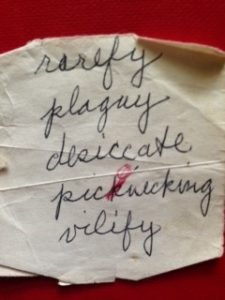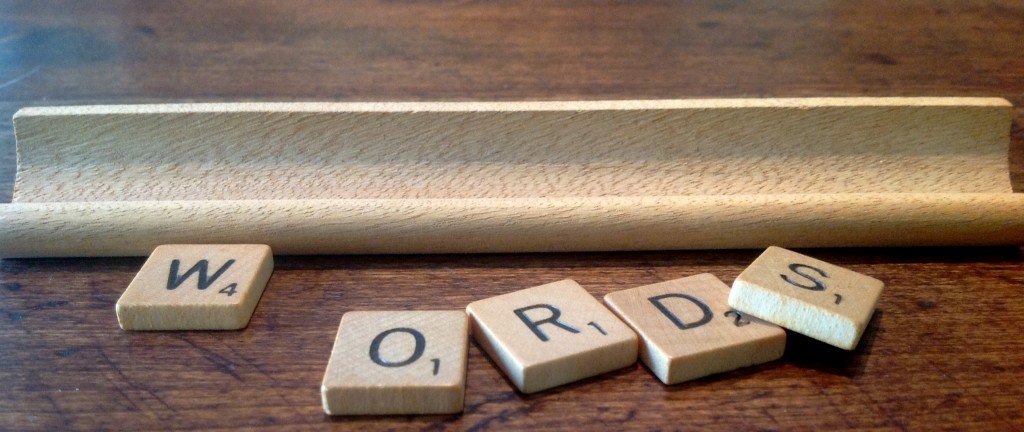My grandmother was a card shark. Not that she would have appreciated being called one. In her day, that usually meant someone who cheats at cards. But usages change and words evolve. Today, according to grammarist.com, among other sources, “card shark” (as opposed to “card sharp”) is generally understood to mean someone who’s skilled at playing cards and it no longer has a negative connotation. I’m pretty sure my grandmother would appreciate the whole idea of words and phrases evolving over time, because, in that same positive sense of the term, she was a word shark as well.
She solved crossword puzzles in ink and cracked cryptograms like a military intelligence agent. She also collected words to use in the many different games — Word Duel, Jotto, Scrabble, Boggle, etc. – that she played with skill and joy, unafraid to trounce her opponents, including her own grandchildren. After she died, I came upon one of her word lists in a kitchen drawer and, of course, I instantly pocketed it.
It was like finding some secret talisman or key to a treasure chest, this scrap of paper with five words, unrelated except for the fact that they’re all fiendishly tricky to spell: rarefy, plaguy, desiccate, picnicking, vilify. Even as I type this, spell-check isn’t going to let me have “plaguy” without a fight.
 I don’t recall ever using the words from this list for anything, yet I hold onto them still and study them as if they’ll enlighten me – and, in their way, they do. They evoke a time and a place. They bring back a house where toast is made in the oven, and the shades are lowered against the bright heat of a Tennessee summer. When I read them, I hear them spoken in my grandmother’s voice. That is the power of words, even in a simple list.
I don’t recall ever using the words from this list for anything, yet I hold onto them still and study them as if they’ll enlighten me – and, in their way, they do. They evoke a time and a place. They bring back a house where toast is made in the oven, and the shades are lowered against the bright heat of a Tennessee summer. When I read them, I hear them spoken in my grandmother’s voice. That is the power of words, even in a simple list.
Recently I’ve begun playing an online version of Scrabble and I’ve come up with my own list (no doubt this is coded in my DNA). Vid, jo, ono, dan, oe. All of these are words which I saw used successfully in Scrabble games but were unknown to me. And when I tried looking them up, they were not to be found in any conventional dictionary. Then someone steered me towards the official Scrabble dictionary and there they were, all of them. I was dubious at first, maybe even slightly huffy – come on, these weren’t “real” words. But, I changed my mind, partly from reading the definitions (jo: “a sweetheart; oe: “a whirlwind off the Faroe Islands” Who could resist that?), but mostly because, overall, I think it’s better to be on the side of embracing new words instead of resisting them. To stay alive, language has to grow, stretch, shift, evolve. Not desiccate. Or rarefy. When we automatically rule out words, we’re no different from spell-check, which has now scolded me for every single word on my own list. That is not helpful. Truly, it’s plaguy. My grandmother has spoken.
Suzanne Freeman, fiction editor
Follow us!
Share this post with your friends.


Loved this blog! Very touching and true.
elizabeth
L.D. was really someone special. Glad you inherited those genes!
Thanks for sharing these thoughts!
Cuz, I always LOVE reading your stories, posts and comments. You are amazingly talented with the written word. Luv ya!